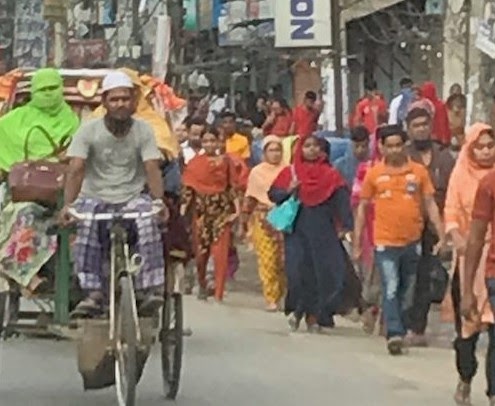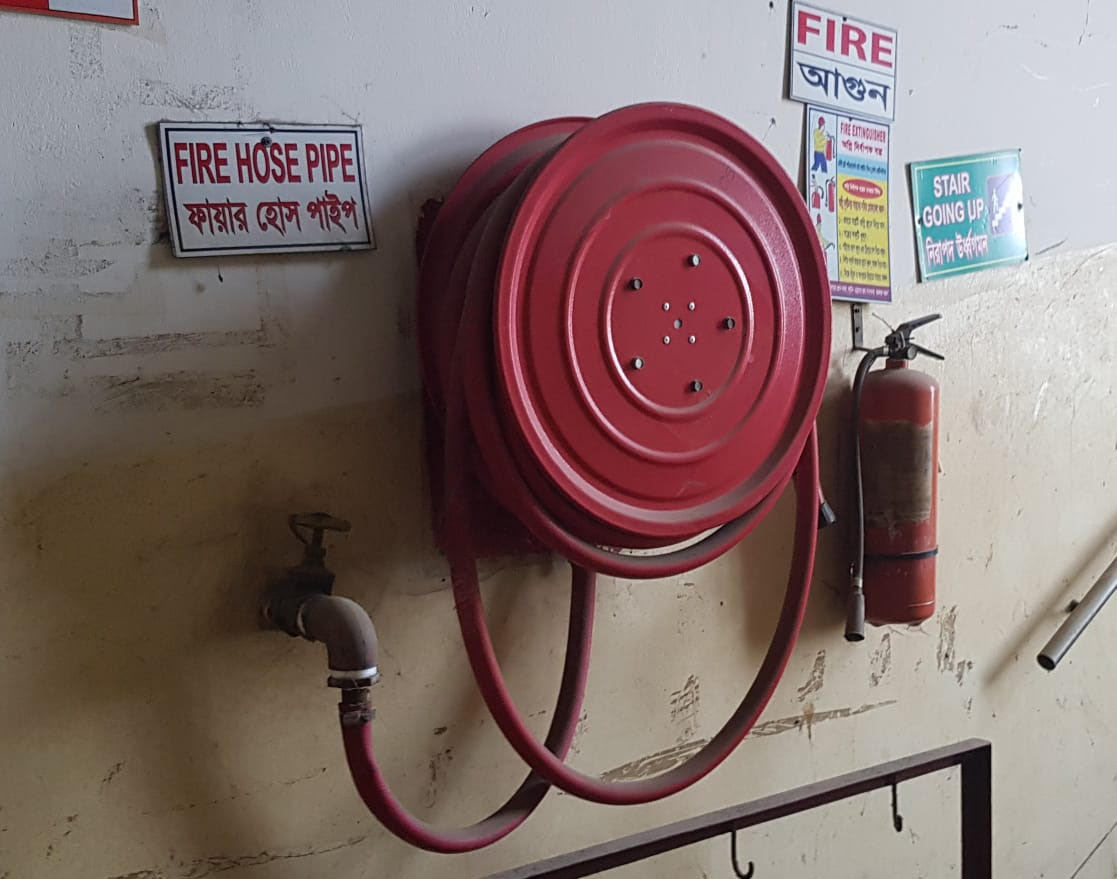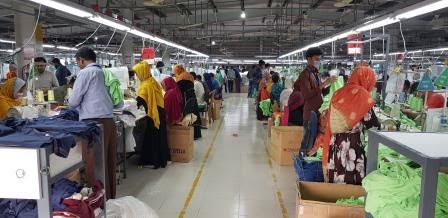The Night I Escaped the Fire
I used to work in a garment* factory somewhere in the middle of Dhaka City. The factory I used to work in was in a large building. It was in pretty good condition for a factory. What we made sold for millions. The owner of the factory was very rich and lived in a mansion*, but he was still generous enough to give all of us factory workers nice homes for us and our families to live in. My friends and I at the factory always wondered, if the owner was so rich, why didn’t he extend the factory? He had enough money to make a factory the size of two large factories, so why didn’t he? It was a puzzle.
I had worked in the factory for ten years, but for some reason, I never felt safe when entering it. I think it was because there weren’t any alarms* or any emergency exits*, all those things you need in the case of an emergency. There were no smoke detectors, but there were some fire extinguishers*, though I had doubts whether anyone could operate them. I could always to push away that uncomfortable feeling by thinking, “Why am I panicking*? I mean, nothing that bad can happen in an ordinary factory, right?” Actually, I don’t just want to tell you about myself; it’s time for you to hear my story of what happened. It’s a story so bad that it has left a deep wound within my mind for the rest of my life.

People on their way to work. Photo by C. Brown
When I worked in the garment factory, I used to work every night until early morning. I worked from 8 pm in the evening till 5 am the next day. I was used to working at this time because I was able to catch up on sleep later. I went to the factory around 7:45 pm every evening, fifteen minutes before I had to start working. I reached the factory just as the clock hit 8 pm and I started working as soon as I arrived. I had to pack the garments into boxes and take them to the delivery truck* so that they could be sent all over the world. Yes, people from richer countries all around the world like to buy the clothes we make, so cheaply, in Bangladesh.
One day, I was packing my fifth box when I smelled smoke. I asked one of my friends, “Hey Rita, do you smell smoke?” She replied, “Yeah, but it’s probably just the incinerator*.” But something was wrong. I could just feel it. I ran out of the room and towards the exit but the exit was on fire! In all directions, the building was surrounded by flames, except the stairs to the first floor of the building. I ran up the stairs and saw a window. I looked around me. Everywhere around me, there was fire and everywhere, I could hear people crying out for help. But it was too late. I could hear the people screaming* as they burned. I told myself, “This is not the end! I will not die like this!” I jumped out of the window without any second thoughts.

Photo provided by Kanita Ridwana
At the time, I didn’t know where my sudden burst of courage* came from, but jumping out of the window was my only choice if I wanted to survive. And I surely did want to survive. Jumping from the first floor wasn’t as bad as jumping from the roof, if you compare the two possibilities. I jumped, hoping that I would make it safely to the ground. As I landed, I heard my arm crack. I was still alive. I had survived! But at that moment, I didn’t really think of that fact. The only thing on my mind was to get as far away from the factory as possible.
Somehow, I had to get to the nearest hospital. I could feel myself breathing hard because of the lack of oxygen* and all the smoke. I needed to make it to the nearest hospital as fast as possible. Even though my arm was so painful, I ran as fast as I could. In fact, I was running without knowing where I was going as I was so fearful. Fortunately, I went in the right direction. There was a hospital nearby, so I ran inside. I was completely out of breath by this time.
I saw a lady who looked like the receptionist* there, and although I could hardly breathe, I was able to tell her that the garment factory nearby was on fire. As soon as she heard this, she called the Fire Department. At last she seemed to notice how injured I was. She said, “Oh my! You look badly hurt! Come on, I will get you a doctor right away.” She did as she said and found a bed for me, and told me to rest. Soon a doctor came to check on me. Thankfully, I only had injuries that wouldn’t take long to heal. The doctor gave me oxygen* because I was finding it so hard to breathe after so much smoke had entered my lungs. They hurt, but I was happy just to be alive.
Soon a number of injured people came into the room I was in, many of them were in pain from the burns they had suffered and most of them were also having problems with breathing but the saddest sight of all was seeing the hospital staff bringing in the burnt bodies.
Two of the bodies were those of my friends. I couldn’t believe it. I could only recognize them by what remained of their clothing. I felt such pain inside, and my eyes began to water, but at that time, I had to hold my sadness in. I couldn’t cry out loud because I had to breathe in the oxygen that was being given to me. To say I was hurting does not fully describe how I felt. I was completely crushed. My whole world had turned upside down that one evening.
Things did get better after that though. I slowly got better. The other workers who had survived also became well again. The factory owner even built another factory. It was larger and more modern than the first factory. But this time, it had everything we needed to keep safe, like fire alarms, smoke detectors, and a proper fire extinguishing system. We also held regular safety practice and learnt how to operate the safety equipment.

Inside a garment factory. Photo by Mahesh Chandra Sarma
I still work for the same garment factory. Nowadays, my health is absolutely fine and my body is in great condition again. However, as for my state of mind... Well... that frightening experience has had a big effect on the kind of person I am now. I have become a much more inward looking and quieter person compared to how social and open I was before. And now, I am really careful to notice everything taking place around me.
To sum it all up, the shock of the fire still affects me badly. Sometimes, I have bad dreams, and I wake up shaking with fear and breathing hard. But mostly, things are much better now and, at last, I am working in a safe place. I just hope something bad like this frightening fire doesn’t happen again in the future. I hope that the rich owners of factories like mine remember to put the safety of their workers first. They cannot afford not to.
_____
Learning Activities
Vocabulary
-
Words from the second 1000 high frequency General Service Word List (GSL). These words are very common in everyday English, so you may already know some of them. Because these words are used all the time in everyday English, it is important to learn them before you learn other less common words.
|
absolutely |
generous |
push |
| afford | heal/health |
puzzle |
|
alive |
hit |
quieter |
|
breath/ breathe |
hospital |
regular |
|
burst |
hurt |
roof |
|
cheaply |
information |
saddest/sadness |
|
check |
inside | shock |
| clock |
inward |
slowly |
| clothes/clothing |
jumped |
smell |
|
compare |
loud |
smoke |
|
courage |
lungs | staff |
|
crack |
nice |
stairs |
|
crushed |
pack |
sudden |
|
delivery |
pain/painful |
thankfully |
| flames |
practice |
uncomfortable |
| frightening | probably | wake |
-
Words from the Academic word List (AWL). These words are very common in academic English, so if you plan to study at university, or are already studying at university, you should learn them.
| affects | equipment | sum |
| detectors | injured/injuries | survive |
-
*Off List words. These words are not so common in English, so there is no need to learn them unless you already know all of the words in lists one and 2 above.
| alarms | extinguisher | mansion | receptionist |
| emergency | garment | oxygen | screaming |
| exit | incinerator | panicking | truck |
Comprehension Questions
-
Remembering: How did the writer escape from the fire?
-
Remembering: Who were the people that helped her?
-
Understanding: Why did she have to escape in this way?
-
Understanding: What does the writer mean by the last sentence, “They cannot afford not to.”? Who are ‘they’ in this sentence?
-
Understanding: What does the writer mean by "a sudden burst of courage"? In what other situations might someone need this?
Critical Thinking Questions
-
Analysing: (Identifying the order of events)
-
Work in a small group. Tell each other all the things that happened in the story, in English.
-
Write a list of eight things that happened in the story and put them on one piece of paper. Do NOT number them. Use some of the vocabulary from lists one and two above in your sentences.
-
Cut your list into eight separate strips, so that there is one sentence (about one event) on each strip of paper.
-
Mix up the order of your strips of paper, then exchange your eight sentences with people in another group.
-
Using the eight sentences you received from another group, read the information, and put the events into the same order as they happened in the story.
-
Check that the events are in the right order by looking at the story again and discussing this with your classmates and your teacher.
-
Take turns to read your re-ordered list of events out loud to each other.
-
-
Applying: Work with a partner or in a group of three. Take a walk around your building. Look for fire equipment or notices about what to do in case of a fire. Make a note of where you found these things. Report back to your classmates about what you found, in English. Write a letter to your school principal about what you found, and, if necessary, what your school needs. If you need more equipment, or better emergency plans, how can you organise a way to get this?
-
Evaluating: How can places where there are a lot of people improve their safety standards and prepare for emergencies? Who should pay for these improvements? What should be done to make sure that safety standards and rules are followed by everyone? Who should be responsible for making sure this happens? What should be done when these standards are not followed?
-
Creating: Do some research (on the Internet) about how to keep yourself safe in an emergency such as a fire or an earthquake. Create a practical emergency plan, in English, that explains what to do in case of an emergency. What should you do and where should you go? Who will check that everyone is safe and how will you record that information? (Do you need to choose and train emergency monitors, for example?) Explain your plan to your classmates. As a class, vote on the best plan and together practise it for real. Finally, make wall posters with clear instructions that explain that plan, and put these up on your classroom wall to remind everyone what to do. Make sure to practise your emergency plan as a whole class at least once every term.